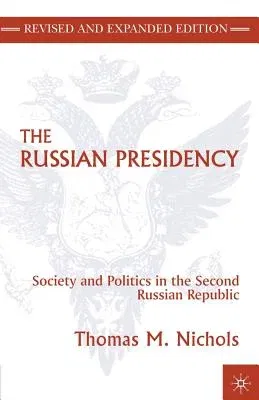T Nichols
(Author)The Russian Presidency: Society and Politics in the Second Russian Republic (1999)Paperback - 1999, 24 October 2001

Qty
1
Turbo
Ships in 2 - 3 days
In Stock
Free Delivery
Cash on Delivery
15 Days
Free Returns
Secure Checkout
Print Length
235 pages
Language
English
Publisher
Palgrave MacMillan
Date Published
24 Oct 2001
ISBN-10
0312293372
ISBN-13
9780312293376
Description
Product Details
Author:
Book Edition:
1999
Book Format:
Paperback
Country of Origin:
US
Date Published:
24 October 2001
Dimensions:
20.88 x
14.02 x
1.78 cm
Genre:
Russian
ISBN-10:
0312293372
ISBN-13:
9780312293376
Language:
English
Location:
New York
Pages:
235
Publisher:
Weight:
240.4 gm

